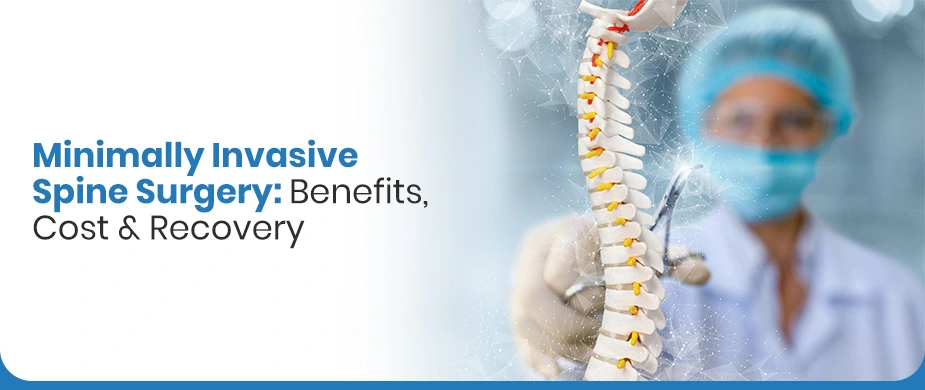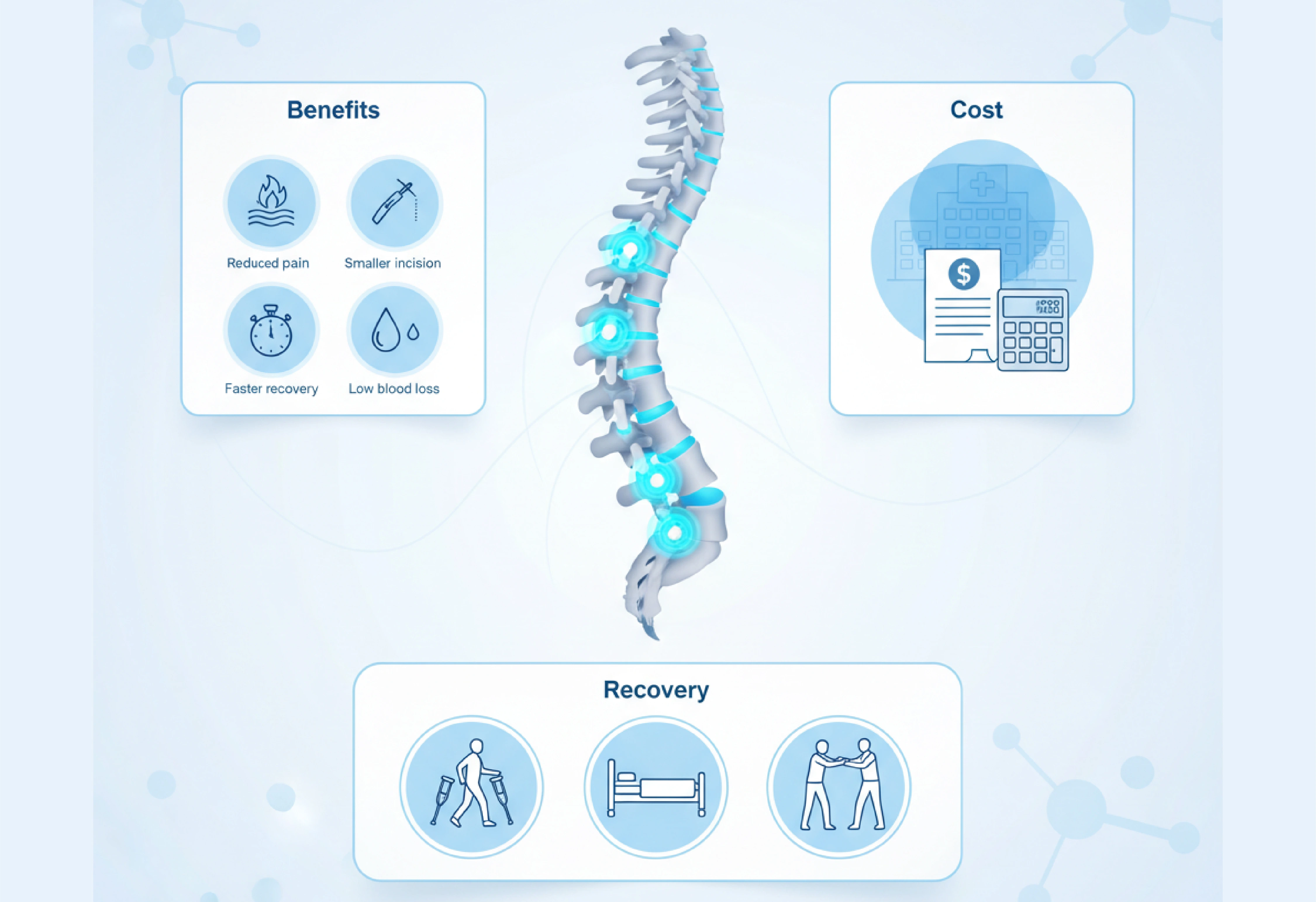
Book an Appointment
Call Us09958011121Minimally Invasive Spine Surgery: Benefits, Cost & Recovery
Minimally Invasive Spine Surgery (MISS) is a type of surgery on your spine (backbone) without damaging nearby muscles and tissue. It is also known as less invasive spine surgery.
You may ask: Why is it called ‘minimally invasive’? Because when compared to traditional surgery, it uses tiny cuts and special tools to fix spine issues without harming muscles much.
This means MISS comes with benefits like less pain, quicker healing, and smaller scars compared to traditional surgery. Surgeons at advanced centers like IBS work through small openings with cameras and tools, making recovery faster and safer.

Why Might I Need Minimally Invasive Spine Surgery?
Your doctor will decide if you are a good candidate for minimally invasive spine surgery. They may recommend this procedure in the following situations:
- Herniated disk
- Spondylolisthesis (when a vertebra slips forward)
- Spondylolysis or pars defect (a defect in part of a lower vertebra)
- Fractured vertebra
- Spinal stenosis (narrowing of the spinal canal)
- Spinal deformities (like scoliosis)
- Spinal instability
- Surgical removal of a spinal tumor
- Spinal infection
- When medications or physical therapy fail to relieve symptoms
Different Types of Minimally Invasive Spine Surgery
There are many different types of minimally invasive spine surgery; some of them are:
- Discectomy: Removes a herniated disc to relieve nerve pressure.
- Microdiscectomy: Minimally invasive discectomy using a small camera.
- Laminectomy: Removes part of the bone to ease spinal nerve pressure.
- Foraminotomy: Widens nerve openings to reduce compression.
- Spinal Fusion (TLIF, ALIF): Fuses vertebrae for spine stability.
- Corpectomy: Removes part of the vertebra, replaces it with a cage.
- Artificial Disc Replacement: Replaces a damaged disc with an artificial one.
- Endoscopic Spine Surgery: Uses an endoscope for highly precise, small-incision surgery.
Get a Cost Estimate
How Minimally Invasive Spine Surgery Can Benefit Me
If recommended for your spine-related condition, this less invasive spine surgery offers you the following benefits:
1. Shorter Surgery
These surgeries require smaller incisions, which means the surgery takes less time when compared to open surgery. This also reduces time under anesthesia.
2. Minimal Anesthesia
Because these surgeries are quicker and less invasive, doctors administer less anesthesia. This also helps lower anesthesia-related risks.
3. No Requirement for Blood Transfusion
There is minimal risk of blood loss, which lowers or eliminates the need for blood transfusions, increasing safety.
4. Simpler Rehabilitation
These surgeries cause less muscle and tissue damage, which means a smoother, quicker recovery with simpler rehab exercises.
5. Lower Post-Operative Pain
Smaller incisions result in less pain after surgery, so fewer pain medications are needed. This reduces the risk of medicine-related side effects.
6. Minimal Blood Loss
The small incisions and precise tools minimize bleeding considerably when compared to traditional open surgery.
7. Smaller Incision & Scars
Tiny cuts during the surgery leave small scars. This improves cosmetic outcomes and reduces skin trauma.
8. Less Damage to Muscle and Skin
Smaller muscle cutting promotes quicker healing and less weakness post-surgery.
9. Shorter Hospital Stay
Some minimally invasive spine procedures are outpatient, meaning patients can go home the same day or after a short stay. This speeds up the return to normal life.
Recovery Time After Minimally Invasive Spine Surgery
The recovery depends on procedure type and individual factors like general health, healing rates, etc.
Here is the general recovery timeline:
- Return to light activities: within a few weeks
- Return to normal daily activities: about 4 to 8 weeks
- Full recovery: take 3 to 6 months
What is the success rate of minimally invasive spine surgery?
The success rate for minimally invasive spine surgery is determined by reducing symptoms such as pain by managing the underlying cause. The success rate of minimally invasive spine surgery is above 90% and has a positive success rate as long as you have reasonable expectations. Patient satisfaction rates typically exceed 80-90% based on the severity of the condition and types of procedures.
Minimally Invasive Spine Surgery Cost
The cost of a less invasive spine procedure is based on multiple factors, like:
- Type of surgery and hospital
- Location of the hospital
- Advanced surgical tools used
- Surgeon’s expertise and experience
- Insurance coverage
- Other individual factors
Here is the approximate cost range
- Discectomy: ₹1,40,000 – ₹1,80,000
- Microdiscectomy: ₹1,80,000 – ₹3,00,000
- Laminectomy: ₹1,40,000 – ₹1,80,000
- Foraminotomy: ₹1,80,000 – ₹2,50,000
- Spinal Fusion (TLIF, ALIF): ₹2,50,000 – ₹5,00,000
- Corpectomy: Cost varies; typically higher than spinal fusion, based on complexity
- Artificial Disc Replacement: ₹2,00,000 – ₹4,00,000
- Endoscopic Spine Surgery: Generally similar to discectomy or microdiscectomy, depending on complexity.
Conclusion
Your spine supports your body and helps you walk, twist and move; any injuries or conditions in your spine can hamper your daily activities. Hence, to keep it strong, follow these tips:
- Maintain a healthy weight
- Maintain proper posture
- Stretch
- Get adequate sleep
- Build core strength
- Reduce or eliminate inflammatory foods
But in case you face spine-related issues, then consult an experienced spine specialist like Dr. Dewaker Sharma at IBS Hospital for the appropriate, timely treatment.
Watch the inspiring recovery of Nikhil, 18 years old, from cervical spine injury
How to Contact IBS
You can contact us through:
- 01140846835
- Email:ip@ibshospitals.com
- Address :73 Ring Road, Lajpat Nagar 3, Delhi - 110024, India
 By -Dr Aaksha Shukla |
November 24, 2025 | 9 Min Read
By -Dr Aaksha Shukla |
November 24, 2025 | 9 Min Read
Parkinson’s Disease Treatment Hospital in India
Brain Stroke Treatment Hospital – Emergency Care
Stroke Paralysis Treatment Hospital – Advanced Neuro Care
Paralysis Treatment Hospital in India – Cost & Recovery
Brain Infection Symptoms, Causes, and When to Seek Emergency Care
Is Spine Surgery Right for You? Here’s How to Know
Brain Health at Every Age: Preventive Neurology Tips
International Patient Guide: Visiting India for Neuro & Spine Treatments
Robot-Assisted & Navigation-Guided Surgery: Safer Brain & Spine Procedures
Sports Injury Recovery: How Arthroscopy Helps You Heal Faster?
How Deep Brain Stimulation (DBS) Helps in Parkinson’s & Tremor Control
Early Warning Signs of a Brain Tumour & When to See a Neurosurgeon
Signs of a Stroke: When to Seek Emergency Neuro Care
Best Neurosurgery Hospitals in Delhi NCR: A Detailed Guide
Best Tips for Sports Injury Recovery
Guide to Stroke Prevention and Recovery
How to Manage Parkinson’s Symptoms Effectively
Traumatic Brain Injury: Symptoms, Causes, and Treatments

